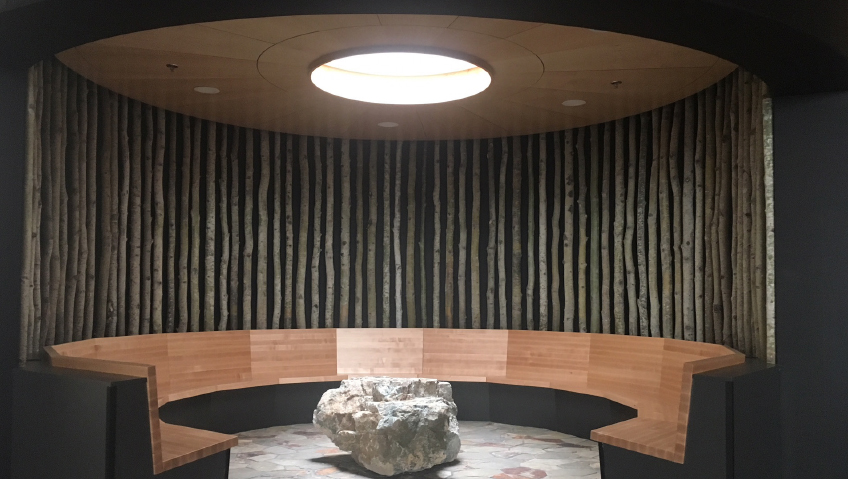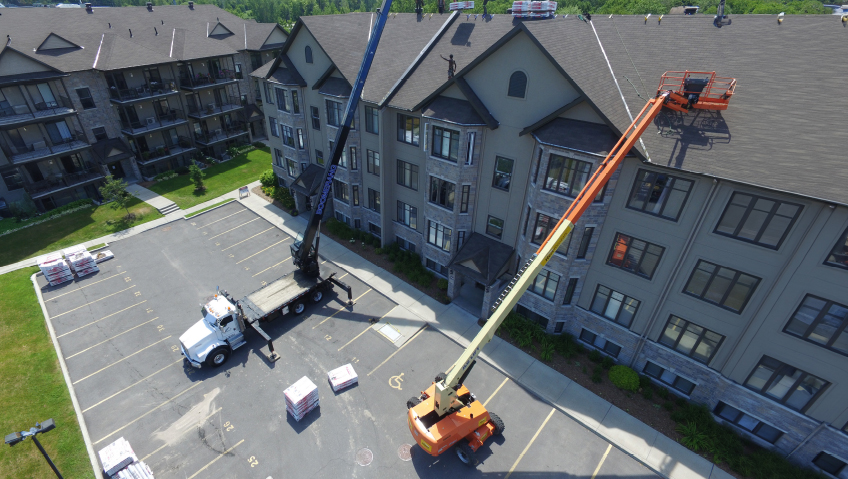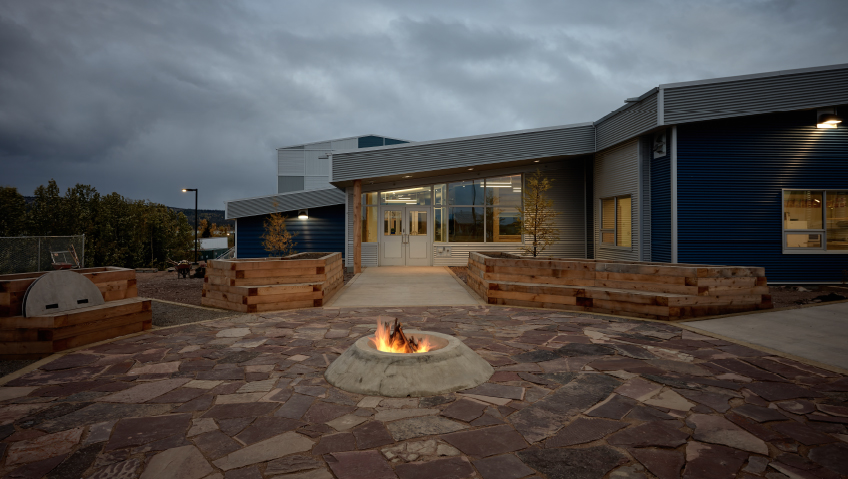Top 40 Woodworks, a millwork shop based in Kamloops, British Columbia, began its story in the 1990s when it was founded by Jack Mendes. In the early years, Jenny Gayfer worked as a wholesale supplier to Top 40 before she came to work for Mendes directly in 2012.
After a decade of working with the company, Jenny and her business partner, Byron Gayfer, decided to buy the company outright, with Jenny citing the book Buy Then Build by Walker Deibel as an influence. Almost two years after that fateful decision, the Gayfers are seeing continued success as the business seeks to bring modern approaches into a more traditional industry.
Top 40 Woodworks has three distinct divisions: commercial millwork, national store fixtures, and design-build projects, as they have three interior designers on staff. The company is certified by the Architectural Woodwork Manufacturers Association of Canada (AWMAC). This is a distinction as AWMAC functions as the regulatory body for architectural millwork in Canada, and they uphold the highest industry standards.
How it works is AWMAC certification is requested on a project by the owner when they want to ensure quality millwork standards for their job. Once the project has been completed, AWMAC will conduct an inspection and call out any infractions in accordance to the AWMAC Standards Manual that need be remedied immediately by the millwork company to obtain certification on the project. This builds trust in an industry that self-regulates.
Top 40 values their relationship with AWMAC and respects the association’s oversight to hold the woodworking industry accountable. Top 40 has garnered several AWMAC awards of excellence for achieving the highest standard in quality millwork. “It’s a privilege to belong to and perform AWMAC-certified projects,” Gayfer says.
The millwork industry has seen rapid advancements in equipment and technology in the past decade. There was a time when shop owners believed that if they could hear the machinery working, then the shop was thought to be profitable. Workplace culture wasn’t really considered a “thing”. Today, Top 40 approaches things from a more sophisticated and data-driven approach, embracing systems, advanced equipment, and processes to drive decision-making and inform manufacturing practices.
Top 40’s management believes the strength of a healthy workplace culture together with leveraging data and software is what propels a successful organization. Instead of a top-down type of operation that is prevalent in the millwork industry, Jenny Gayfer considers their approach to be more of a matrix dynamic, pointing out the transparent management, open communication, and collaborative relationships amongst the staff.
Of these newer practices, several stand out as significant in the company’s day-to-day operation. The first is the prevalent use of automated equipment, which has bypassed the more traditional shop equipment like table saws or forklifts in favour of more sophisticated equipment and robotics, such as their material handling system. The shop has also embraced the ideals of lean manufacturing, maximizing productivity while minimizing waste to ensure that its processes are as efficient as possible.
Gayfer touts the software systems used by the company as especially helpful in bringing it into a new age for the industry. One of these systems is its enterprise resource planning (ERP) software, INNERGY, which runs its manufacturing workload, including sales, project management, production, final delivery, and more. The data generated from the Innergy ERP system is what guides the organization to its goals. She highlights the software’s creator, Marc Sanderson, as someone who is changing the millwork industry worldwide with his advanced education platform which focuses on a very upstream approach.
Where INNERGY is a tool for the manufacturing of projects, Top 40 uses another tool from the book Traction by Gino Wickman to run the organization and execute their vision. It is called the entrepreneurial operating system (EOS) and helps define the company’s goals, guide their growth, and stick to the vision company-wide. Again, metrics and data from the EOS inform the management team on the best course ahead.
Strong communication is one of the highest company values at Top40. They have weekly Microsoft Teams calls for the eight departments, monthly Townhalls on the production floor for all staff, as well as quarterly “Alignment Meetings” for roundtable discussions. These offer an opportunity to foster collaboration and strengthen commitment to the company vision.
Teamwork is what propels the organization and is a core ideal for Top 40. “If you don’t have buy-in from your team and unification among the team, you won’t get anywhere fast,” Gayfer says. Contributions from stakeholders also accelerate the attitude and willingness of the group, so the company is conscious to bring all stakeholders into any discussion about change and vision, and this has propelled the pace of change in the organization.
The company is looking to be a leader in more ways than just on the technology front. Speaking specifically on the role of women in the millwork industry, Gayfer says that generally, women tend to be strong communicators, placing value on relationships and collaboration and placing less emphasis on the adversarial tendencies that can crop up within traditionally male-dominated workplaces.
She estimates that in 2021, around 10 percent of the staff of Top 40 was female; today, the count is closer to 30 percent, thanks to the great success the business has had in attracting capable and educated women to its workforce. These new hires have rocketed the company ahead across all departments. Gayfer believes that women have already had a phenomenal impact on the organization and aims to carry this trend into the future.
Indeed, 2023 has been a largely positive year for the company. Gayfer says that interest rates in construction have begun to level off, which means that projects that may have been shelved during the time of climbing rates now have a greater chance of being green-lit. Theoretically, more work should come into the market soon thanks to more stable—or even lower—interest rates.
The level of automation in millwork, generally, has also been an important factor in industry growth, but this kind of progress does come with a very high price tag. The barrier to entry for newer businesses in the industry is much higher than ever before, so there are fewer large millwork shops entering the sector and less work coming out of it. This coincides with the purging effect that COVID-19 had across the entire construction industry, leading to the development of a ‘survival-of-the-fittest’ mentality among those businesses that remain. Any non-viable shops were forced to shut down, while the rest remained strong.
It is a “generally excellent outlook if you’re already in the market,” says Gayfer, and Top 40 staff members already have many reasons to feel good about the future. Into the new year and even into 2025, the company will be continuing to improve its internal processes and software as well as further investigating lean manufacturing practices. Further down the line in 2026 to 2027, she says that the company may investigate big changes for its manufacturing equipment.
The past year saw the company hit $16 million in sales, with $20 million expected in two years and $25 million within the next five years. Jenny and Byron Gayfer are happy that they took a chance in acquiring Top 40 and continuing it under their own terms, with the new management already proving capable and profitable in the millwork industry.






